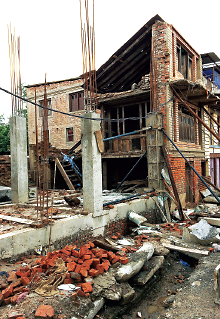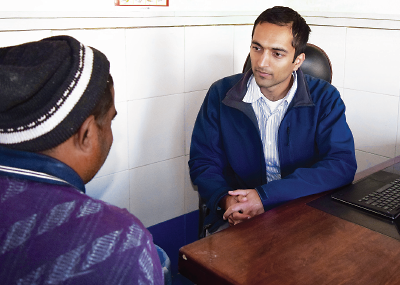Persistence Pays Off to Expand Mental Health Care in Nepal
Abstract
Working with local providers and developing collaborative systems of care enhance access in rural Nepal.
Among those who have responded to the need for mental health care in Nepal after the massive earthquake in April 2015 were two young psychiatrists who have deep but quite different experiences in Nepal and whose work continues today.

The rebuilding of homes in Sankhu, 12 miles east of Kathmandu, has progressed slowly.
The earthquake killed more than 8,000 people, injured at least 21,000 others, and left millions homeless.
Brandon Kohrt, M.D., Ph.D., is an assistant professor of global health and psychiatry at Duke University and the Duke Global Health Institute in Durham, North Carolina. He graduated from medical school at Emory University in 2009 with a doctorate in anthropology, writing his dissertation on political violence and mental health in Nepal following the country’s 10-year civil war. He has worked in Nepal for 20 years, integrating epidemiological, anthropological, ethnopsychological, and neuroendocrinological approaches.
Kohrt and his former grad student, Megan Ramaiya, M.Sc., are applying some of the insights into resilience in another program in Nepal.
They have been working in Sankhu, an historic town about 45 minutes from Kathmandu, where 104 people died in the earthquake, including many children. Kohrt is a technical advisor for Transcultural Psychosocial Organization (TPO) Nepal, which trains Nepali psychiatrists and primary care providers. More recently, they began a school-based mental health program adapting the skills components of dialectical behavior therapy (DBT) as a model for care.
“DBT is an evidence-based therapy [developed by Marsha Linehan, Ph.D.] that made sense in Nepal, because it is based on Asian world views and is consistent with Nepali concepts of balancing the heart and the mind,” said Kohrt.
The program began at the main high school in Sankhu this July. It provides services to 7th, 8th, and 9th graders, who are experiencing stress from not only the quake but also their 10th grade school-leaving exam. Students get 10 sessions, scheduled for an hour before or after school.

Bibhav Acharya, M.D., evaluates a patient with psychosis in a clinic in Bayalpata Hospital, operated by Possible in partnership with the Nepali government.
“We hope to cover the entire school by October,” said Kohrt. “Then we’ll evaluate it and modify it before we expand the program.”
A second psychiatrist, Bibhav Acharya, M.D., was born in Nepal and is now an assistant professor of psychiatry at the University of California, San Francisco. Nine years ago, he and four other medical students founded Possible, a nonprofit organization that set out to improve medical care in Nepal.
One of their first tasks was developing a primary care system that could provide specialized care like mental health in the remote town of Achham—a 30-hour bus ride from Kathmandu, the capital.
He also found that primary care physicians in rural Nepal received almost no training in mental health, he told Psychiatric News. “They may have memorized criteria for depression or visited jails to see hopelessly psychotic patients, but they had no exposure to long-term or community care.”
So Acharya and three colleagues conducted focus groups to determine the educational needs of primary care providers in rural Nepal. Then they designed a training program that confronted stigmatized attitudes toward mental illness and taught primary care clinicians more about psychiatric symptoms, diagnosis, and management.
Their program did not simply send the trainees out on their own afterward, however. Possible developed what Acharya calls “pro-active quality control.”
In this system, the rural doctors come up with their best diagnoses and review them weekly with a psychiatrist in Kathmandu. The psychiatrist cross-checks their diagnoses, fine-tunes treatment plans, and expands their knowledge in the process.
After the earthquake, the government asked Possible to run a similar hospital in Dolakha, at the epicenter of the second major quake, which occurred in May 2015. In a visit to Dolakha in June, Acharya saw patients and again conducted trainings for local clinicians.
He and Kohrt don’t work together in the field given the geographic distances in Nepal, but they do keep in touch, said Acharya.

Megan Ramaiya, M.Sc. (left), and Manjila Pokharel, M.S., TPO Nepal clinician, train earthquake survivors in dialectical behavior therapy skills.
“We share frustrations and challenges,” he said. “Brandon’s group has done a lot of work building our culturally appropriate mental health skills and services, and we utilize their work all the time.”
They also share a similar vision. Their work must be of high quality, measurable, and coordinated with the government. Coordination is critical so that the models they’ve created will persuade the government to replicate them in other settings.
Acharya also noted that mental illness is a lesser concern in many low- and middle-income countries until they are confronted by a crisis like an earthquake or a tsunami.
“There was some awareness because there had been a civil war for a decade,” he said. “In Dolakha, both people in the community and local medical professionals are a lot more attentive to mental illness now than they would have been if there had been no earthquake.” ■
Acharya and others who have worked in similar conditions in Nepal, China, and India will present a symposium at IPS: The Mental Health Services Conference in Washington, D.C., at 8:30 a.m. on Friday, October 7, titled “Challenges and Opportunities in Implementing Collaborative Mental Health Care in Low- and Middle-Income Countries.” Registration information can be accessed here.



